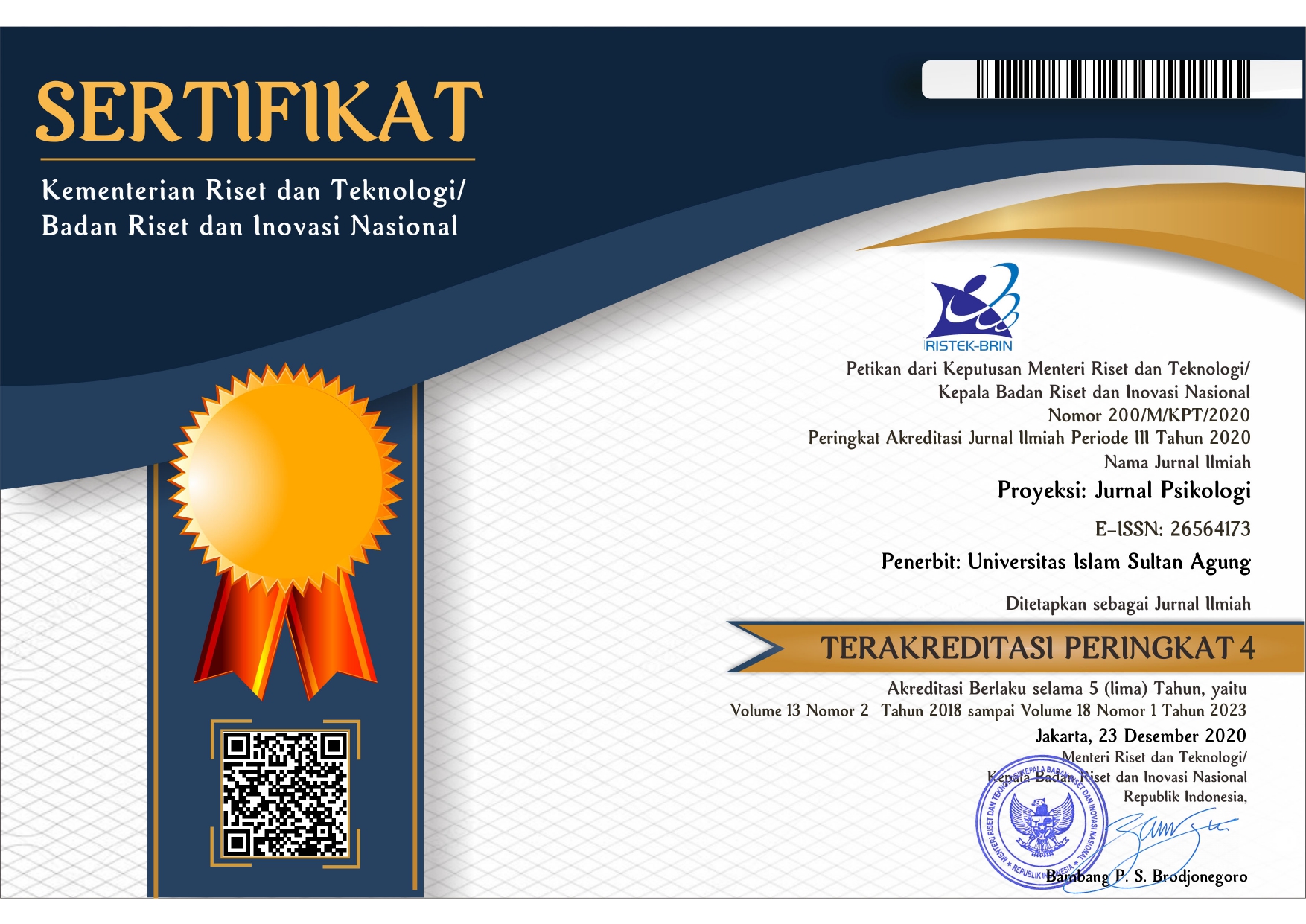ANALISIS RE-ENTRY SHOCK PADA MAHASISWA SELAMA TRANSISI DARI MODEL PEMBELAJARAN ONLINE KE PEMBELAJARAN TATAP MUKA DI MASA PANDEMI COVID-19
Abstract
Keywords
Full Text:
PDFReferences
Alkubaidi, M., & Alzhrani, N. (2020). “We Are Backâ€: reverse culture shock among saudi scholars after doctoral study abroad. Https://Doi.Org/10.1177/2158244020970555, 10(4). https://doi.org/10.1177/2158244020970555
Arthur, N., Becker, S., Dressler, R., Crossman, K., & Kawalilak, C. (2020). Pre-service teachers and study abroad experiences: Don’t forget about them when they come home. Teaching and Teacher Education, 89, 102979. https://doi.org/10.1016/J.TATE.2019.102979
Corbin, J. M., & Strauss, A. L. (2014). Basics of qualitative research techniques and procedures for developing grounded theory. (Fourth Edition). Sage Publications.
Cucinotta, D., & Vanelli, M. (2020). WHO declares COVID-19 a pandemic. Acta Bio-Medica: Atenei Parmensis, 91(1), 157–160. https://doi.org/10.23750/ABM.V91I1.9397
Cupsa, I. (2018). Culture shock and identity. Transactional Analysis Journal, 48(2), 181–191. https://doi.org/10.1080/03621537.2018.1431467
Dardjito, H., Robiasih, H., & Pamungkas, T. B. (2020). Cultural shock in learning: students’ strategies in the beginning of pandemic. International Conference on Technology, Education and Science, 169–173. https://jurnal.ustjogja.ac.id/index.php/incotes/article/view/9562/3911
Dykhouse, E. C., & Bikos, L. H. (2019a). Re-entry friction: the curious effects of cultural dislocation on outcomes for global service learning returnees. International Journal of Intercultural Relations, 72, 96–108. https://doi.org/10.1016/J.IJINTREL.2019.07.004
Dykhouse, E. C., & Bikos, L. H. (2019b). Re-entry friction: the curious effects of cultural dislocation on outcomes for global service learning returnees. International Journal of Intercultural Relations, 72, 96–108. https://doi.org/10.1016/J.IJINTREL.2019.07.004
Edgar, A., & Sedgwick, P. (2007). Cultural theory: the key concepts (second edition). Routledge. https://books.google.co.id/books?hl=id&lr=&id=QbbV7KK-HcAC&oi=fnd&pg=PP1&dq=cultural+theory+the+key+concepts&ots=N3uGsf0v3X&sig=A6yIp5PmtwOdItvABo5HBz-8KEM&redir_esc=y#v=onepage&q=cultural%20theory%20the%20key%20concepts&f=false
Emiliani, F., Contarello, A., Brondi, S., Palareti, L., Passini, S., & Romaioli, D. (2020). Social representations of “normalityâ€: everyday life in old and new normalities with COVID-19. Papers on Social Representations, 29(2), 9.1-9.36. https://www.psr.iscte-iul.pt/index.php/PSR/article/view/552
Fanari, A., & Segrin, C. (2021). Longitudinal effects of U.S. students’ reentry shock on psychological health after returning home during the COVID-19 global pandemic. International Journal of Intercultural Relations, 82, 298–310. https://doi.org/10.1016/J.IJINTREL.2021.04.013
Hendrayati, H., & Pamungkas, B. (2016). Implementasi model hybrid learning pada proses pembelajaran mata kuliah statistika II di prodi manajemen FPEB UPI. Jurnal Penelitian Pendidikan, 13(2). https://doi.org/10.17509/JPP.V13I2.3430
Kuning, S. D. (2021). Culture shock: online learning in the COVID-19 pandemic phase. Jurnal Humaniora Dan Ilmu Pendidikan, 1(1), 55–62. https://doi.org/10.35912/JAHIDIK.V1I1.357
Mbous, Y. P. V., Mohamed, R., & Rudisill, T. M. (2022). International students challenges during the COVID-19 pandemic in a university in the United States: A focus group study. Current Psychology, 1, 1–13. https://doi.org/10.1007/S12144-022-02776-X/FIGURES/1
Muttaqin, M., Idris, U., KFrank, S., Ilham, I., Akhmad, A., & Tibul, S. (2020). Cultural shock of college students on facing online learning system during pandemic COVID-19 in papua. Proceedings of the First International Seminar Social Science, Humanities and Education.
Neuliep, J. W. (2017). Culture shock and reentry shock. The International Encyclopedia of Intercultural Communication, 1–9. https://doi.org/10.1002/9781118783665.IEICC0022
Nugroho, R. A., Basari, A., Suryaningtyas, V. W., & Cahyono, S. P. (2020). University students’ perception of online learning in COVID-19 pandemic : A case study in a translation course. Proceedings - 2020 International Seminar on Application for Technology of Information and Communication: IT Challenges for Sustainability, Scalability, and Security in the Age of Digital Disruption, ISemantic 2020, 225–231. https://doi.org/10.1109/ISEMANTIC50169.2020.9234251
Presbitero, A. (2016). Culture shock and reverse culture shock: The moderating role of cultural intelligence in international students’ adaptation. International Journal of Intercultural Relations, 53, 28–38. https://doi.org/10.1016/J.IJINTREL.2016.05.004
Prihatsanti, U., Suryanto, S., & Hendriani, W. (2018). Menggunakan studi kasus sebagai metode ilmiah dalam psikologi. Buletin Psikologi, 26(2), 126–136. https://doi.org/10.22146/buletinpsikologi.38895
Raja, R., Ma, J., Zhang, M., Li, X. Y., Almutairi, N. S., & Almutairi, A. H. (2023). Social identity loss and reverse culture shock: Experiences of international students in China during the COVID-19 pandemic. Frontiers in Psychology, 14. https://doi.org/10.3389/FPSYG.2023.994411
Rohmah, D. S., Aina, R., & Prasetyo, D. T. (2021). Apakah pembelajaran jarak jauh memicu terjadinya culture shock pada peserta didik? Sebuah studi literatur. JKKP (Jurnal Kesejahteraan Keluarga Dan Pendidikan), 8(02), 131–140. https://doi.org/10.21009/JKKP.082.02
Ufairoh, F., Paraswati, F., Imani, K., & Nagari, P. (2021). Penyesuaian diri mahasiswa akibat culture shock pada perubahan sistem pembelajaran di era pandemi. Prosiding National Seminar on Accounting, Finance, and Economics (NSAFE). http://conference.um.ac.id/index.php/nsafe/article/view/907
Wahyuningtyas, B. P., Sumbogo, T. A., Rusgowanto, F. H., Yunus, U., Willyarto, M. N., & Cahyanto, I. P. (2021). Social networking application of international students on fighting culture shock during pandemic. Proceedings of 2021 International Conference on Information Management and Technology, ICIMTech 2021, 712–717. https://doi.org/10.1109/ICIMTECH53080.2021.9534936
Wangsanata, S. A. (2022). Optimalisasi konseling multikultural guna mencegah culture shock siswa saat belajar jarak jauh pada masa pandemi COVID-19. Jurnal Konseling Pendidikan Islam, 3(1), 309–316. https://doi.org/10.32806/JKPI.V3I1.115
Ward, C. A., Bochner, S., & Furnham, A. (2001). The psychology of culture shock. Routledge. https://books.google.co.id/books?hl=id&lr=&id=rqFLe8njy64C&oi=fnd&pg=PP1&ots=4MpdP7_1J7&sig=yHaeqnuQOf2rwV1-_U_N2YBUdK0&redir_esc=y#v=onepage&q&f=false
Wayland, K. (2015). From reverse culture shock to global competency: helping education abroad students learn from the shock of the return home. ASEE Annual Conference and Exposition Proceedings. https://doi.org/10.18260/P.24142
Young, G. E. (2014). Re-entry: supporting students in the final stage of study abroad. New Directions for Student Services, 2014(146), 59–67. https://doi.org/10.1002/SS.20091
DOI: http://dx.doi.org/10.30659/jp.18.1.102-115
Refbacks
- There are currently no refbacks.

Proyeksi by http://jurnal.unissula.ac.id/index.php/proyeksi/ is licensed under a Creative Commons Attribution-ShareAlike 4.0 International License.

